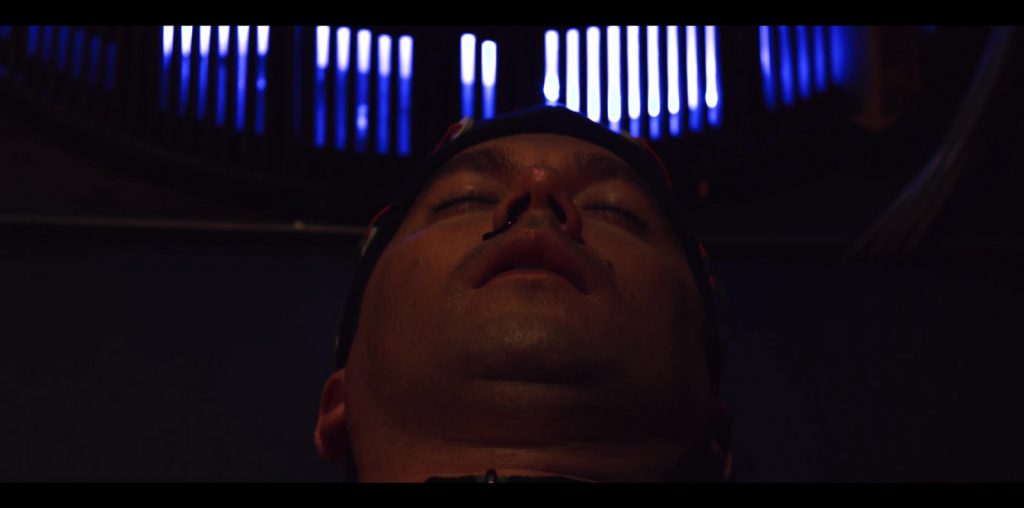
At one point in A Murder in Mansfield, Collier Landry, a sensitive L.A. dude with gelled hair, flips through his childhood diary. One line catches his eye: “When I grow up I would like to be a lawyer.” Laughingly noting that this did not come to fruition––Landry works today as a Hollywood cinematographer––the youthful aspiration nonetheless serves as an eerie portent of trauma to come; When Landry was in his early teens, he found himself embroiled in years of legal proceedings. His father was being tried for the first degree murder of his mother, and Landry would testify as a witness.
A Murder in Mansfield, the latest effort from Oscar-winning documentarian Barbara Kopple, follows Landry as he revisits his cozy Ohioan hometown with hopes of unlocking a new understanding of the grisly crime that has haunted him since boyhood. The film opens with a short recap of the 1990 trial, a gruesome “previously on…” that zeros in on the testimony of twelve-year-old Collier Landry Boyle, a plucky, preternaturally poised kid with a bowl cut who, with storytelling finesse, describes his father’s quick temper and history of household violence. The grainy courtroom footage paints a magnetic portrait of the resilient son of a murderer, and it provides a clear sense of the psychological story potential that must have appealed to Kopple when she decided to pursue the project.

“The story is held similarly hostage within a Mansfield ghost world grimly memorialized by an enigmatic murder.”
Flashing forward, Kopple trails Landry as he treks around Mansfield, reconnecting with his adoptive parents, family friends, and the lead detective from the case in a series of stilted exchanges held on floral living room couches or across faux wood kitchen tables. With some, Landry flips through albums of old polaroids or reads aloud diary passages. Kopple intercuts these conversations with photographs and home videos, mostly of Landry with his mother, a delicate, smiling blonde in monogrammed sweaters.
Landry’s hosts invariably recollect him as affable, if precocious––the detective’s wife recalls Landry once asking her point-blank how much money she made. Landry was forced to mature quickly, we surmise, as a surrogate partner to his mother in place of her husband. Landry’s father, meanwhile, is portrayed as a philanderer who verbally and physically abused his family when he was not too preoccupied with a slew of girlfriends of whom his wife was unhappily aware. Throughout the trial and in the years since, Landry’s father has maintained his own innocence, despite a guilty verdict and wealth of evidence against him.
The most shocking aspect of Landry’s story is what appears to be his incredible capacity for forgiveness. In letters that he wrote to his father in prison, Landry often refers to his abiding love for him, despite believing wholeheartedly in his guilt. The issue that Landry seeks to excavate is not if his father committed the crime but why, and Landry believes that only through some newfound insight into his father’s reasoning will he achieve closure.
Simmering under the surface of this quest is a deeper inquiry into the existence of some universal sense of reasonability. Senseless murder does not sit well with humans. We need a narrative in order to feel like the world has some semblance of overarching order, and therefore that our behavior within that world has value. It is this restoration of order that Landry craves, for without a sound explanation, his mother’s death and his own enduring pain are meaningless.

“The film’s greatest handicap is its graceless circumvention of details from Landry’s current life.”
The film’s greatest handicap is its graceless circumvention of details from Landry’s current life. In an awkward therapy session––therapy hinges on intimacy and privacy, so capturing it on screen often feels icky and staged––Landry admits to a bespectacled analyst that lingering grief and fear of abandonment have bared an ugly head in his adult life, impairing his relationships and work. Landry neglects to elaborate, and the story stays firmly rooted in Mansfield, a place that has changed so little in the time Landry has been gone that it feels like a ghost town conjured straight out of his past. This caginess is presumably due to Landry’s desire to maintain his adult privacy, but it ultimately means that, despite the emotional depth of his endeavor, any empathy that develops between viewer and subject is flimsy and fleeting.
The crux of the film is Landry’s visit to the prison where his father is serving his life sentence, during which Landry comes face to face with the greying man for the first time in over twenty-five years. Both father and grown son refer to Landry’s mother as “Mommy.” We see in Landry a hint of the precocious tween from the trial––his blue eyes wide with innocence and just a tinge of reproach. But the moment is poignant only insomuch as was Landry’s testimony during the film’s opening sequence, when the archival footage displayed him untainted by pretense.
“He’s holding you hostage,” the therapist diagnoses at one point during Landry’s session, meaning that Landry’s father still has a psychological grip on him. This may be accurate, but without sufficient probing into Landry’s adult self, the story is held similarly hostage within a Mansfield ghost world grimly memorialized by an enigmatic murder.

A Murder in Mansfield (2017) Directed by Barbara Kopple.
Grade C+



Good article. However, the 12 year old Collier did NOT have a “bowl haircut”. Look up “bowl haircut” on Google; you’ll see that it’s not. The hair is even and neat and cut carefully around Collier’s ears. It’s a nice little boy haircut but is not a “bowl cut”. Pictures of Collier as a younger boy do show him with a bowl cut. But that is not the style he had in court.
Insightful piece!